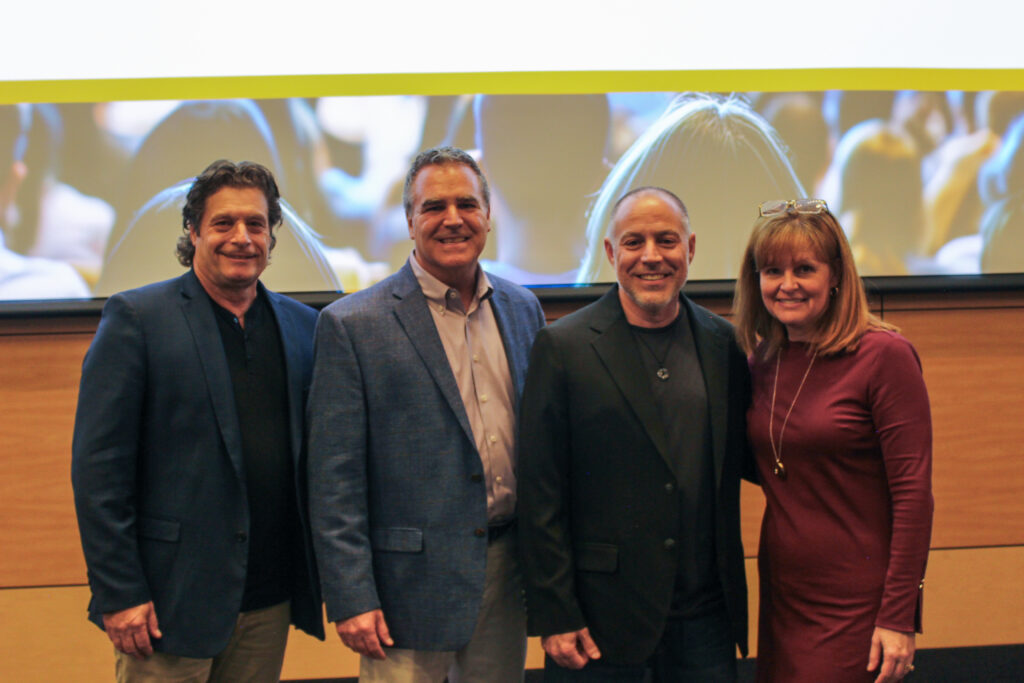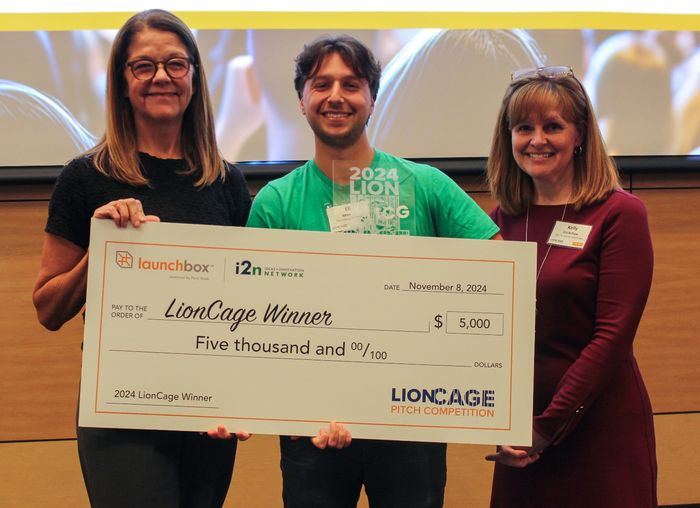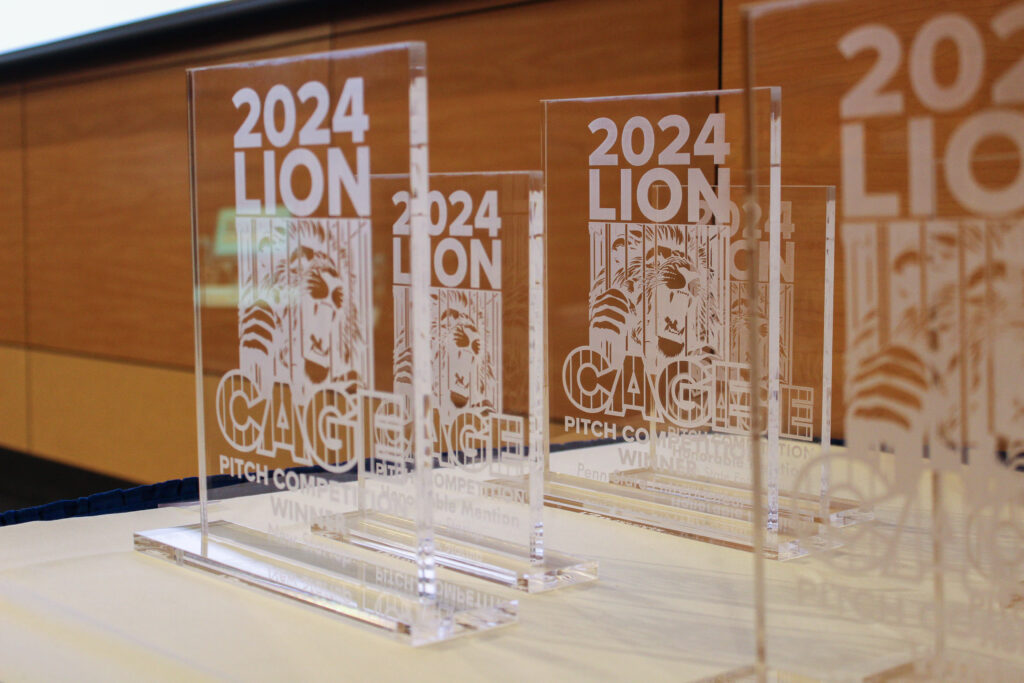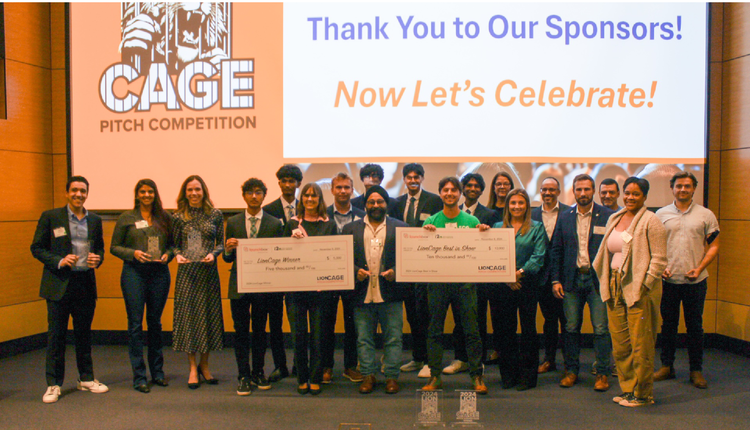Article by: Allison S. Duncan
Photos by: Zhayer Legrand
MALVERN, Pa. — Thirty teams of entrepreneurs gathered on Nov. 8 at Penn State Great Valley for the LionCage Pitch Competition, where they showcased their companies to a panel of judges to seek business advice and compete for prize money. Each team had just five minutes to present their groundbreaking solutions to pressing issues such as healthy food access and navigation for people with low vision.
This collaborative event — organized by Invent Penn State LaunchBoxes at Brandywine and Great Valley, the Chester County United Way and the Chester County Economic Development Council’s Ideas x Innovation Network (i2n) — offered entrepreneurs not only financial rewards but also mentorship, networking, exposure to potential funders, and opportunities to listen to presentations from seasoned innovators and industry leaders. Before the competition, participants met with the event’s organizers for coaching sessions to refine their business plans and pitches.

During the event, the four judges, drawing on their expertise in technology, consulting and business development, awarded $5,000 prizes in various categories, with one $10,000 best in show award. Prize money was provided by several sponsors, including PECO and the Kauders Foundation.
Eli Moraru, co-founder and president of The Community Grocer, took home the prize in the social impact pitch category as well as the best in show prize for his nonprofit organization’s vision to reinvent the corner store and make eating well easier for residents of southwest Philadelphia who want fresh, healthy food options within walking distance.

Jen Gilburg, left, deputy secretary of technology and entrepreneurship for the Pennsylvania Department of Community and Economic Development, and Kelly Cockshaw, right, director of leadership and innovation for the Chester County United Way, presented the social impact initiative prize to Eli Moraru, co-founder of The Community Grocer.
“Innovation changes lives,” Moraru said. “I came to LionCage today to share my vision but really just learn from others. And it was amazing. It blew me away — the competition, but also the collaboration and ideas that were sparked.”
With guidance from community advisers and funding from public and private partners, Moraru and The Community Grocer team are renovating property in Cobbs Creek to launch a retail store, expected to open next spring. Instead of selling a typical corner store’s limited menu of shelf-stable chips and candy, The Community Grocer will offer fresh ingredients and meal kits, all of which can be paid for with benefits through SNAP, the Supplemental Nutrition Assistance Program.
In his LionCage pitch, Moraru explained that SNAP does not allow recipients to use their benefits to buy hot or prepared meals — a significant obstacle for those who do not have enough time or energy to cook. As a creative response to this restriction, The Community Grocer is collaborating with another nonprofit, the Resident Action Committee, to create a workforce development kitchen next door. This facility will allow SNAP recipients to trade in their meal kit for a prepared version of the same meal at no additional cost, in full compliance with federal policy.
The winner in the new startups pitch category was Lectra Technologies, which offers a unique approach to muscle stimulation therapy using a combination of kinesiology tape and Bluetooth-enabled dry electrodes for better pain relief and recovery. Founder Jake Henry was inspired by his mother, who has arthritis, to create a wireless tape with customizable treatment programs and progress tracking through an app.
Julianne Gardner won in the Penn State alumni category for her innovative company, Bottimals, which focuses on improving the bottle-feeding experience for infants and their caregivers. After having her first child, Gardner learned that many babies struggle with bottle-feeding, but the scent of their mothers can be soothing and increase their sucking reflex. To facilitate this sensory connection when mothers and babies are apart, Gardner designed a unique product: a stuffed animal that wraps around a baby bottle and includes a cloth that mothers can wear next to their skin to absorb their scent. The official launch of this patent-pending product is planned for the spring.
In the category of experienced startups, Susan Springsteen won for her pitch as co-founder and CEO of H2O Connected, which develops and manufactures the LeakAlertor products. These multi-patented smart devices and wireless systems detect, alert, diagnose and quantify water waste through tank toilets, so that property owners can save money, conserve water and meet sustainability objectives. H2O Connected is a Qualified Opportunity Zone business, active in revitalizing the city of Coatesville by providing community and workforce development as well as environmental impact.
High school students Ariyan Patel, Ronak Saramya and Kushal Patel won in the young entrepreneurs category for their pitch about the Pathlight Project, devoted to prototyping a navigational device that integrates cutting-edge AI technologies and light to safely guide people with limited vision, offering them more independence, mobility and social interaction.

“The LionCage Pitch Competition exemplifies the incredible drive and creativity of local entrepreneurs who are tackling real-world challenges and shaping the future of our communities,” said Leo Daiuto, director of the Great Valley LaunchBox. He said he intends to continue hosting these collaborative LionCage events to support the startup ecosystem in the Greater Philadelphia region.
“Across the LaunchBox network,” he said, “we are committed to nurturing these innovative ideas and providing the support needed to turn them into reality, creating lasting change throughout Pennsylvania.”
Article originally published on greatvalley.psu.edu

